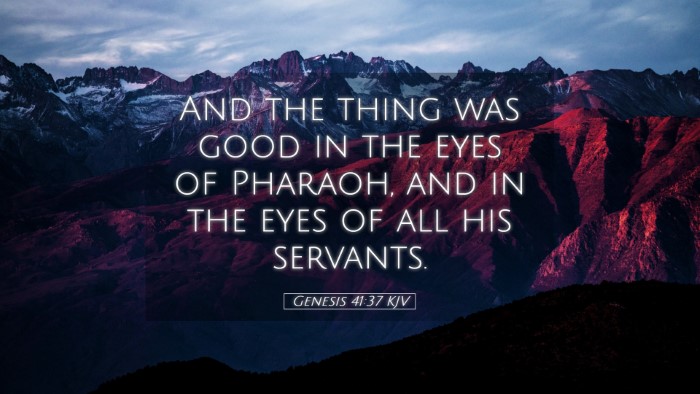Commentary on Genesis 41:37
Genesis 41:37 states, "So the advice was good in the eyes of Pharaoh and in the eyes of all his servants." This verse arrives at a pivotal moment in the narrative following Joseph's interpretation of Pharaoh's dreams regarding the impending famine. As we explore this verse, we will draw insights from esteemed public domain commentaries, providing depth and elucidation on its implications.
Contextual Overview
The story of Joseph, a key figure in the Book of Genesis, is not only a narrative of personal struggle and triumph but also an important theological exploration of God's providence. Genesis 41 recounts Joseph's rise to power following his interpretation of Pharaoh's dreams, symbolizing God's sovereignty in times of crisis.
The Nature of the Advice
Matthew Henry highlights that the counsel Joseph provided was not arbitrary; rather, it was born out of divine insight. Joseph’s wisdom in advising Pharaoh to appoint overseers and store grain during the years of plenty reflects an understanding of both human needs and divine revelation.
Albert Barnes notes that the advice was deemed "good" not just subjectively, but in light of the extreme circumstances Pharaoh faced, emphasizing its practical and prudent nature. It indicates Joseph's capacity to provide solutions rooted in God's knowledge of future events.
Pharaoh's Reception of the Advice
This verse underscores the power of divine wisdom. As Adam Clarke observes, the favor in Pharaoh’s sight indicates a significant trust in Joseph’s ability, which was foundational for Joseph’s elevation to second-in-command in Egypt. Clarke elaborates on how Pharaoh's servants also recognized the soundness of the advice, suggesting a unity in understanding the urgency imposed by the dream’s revelation.
Theological Implications
From a theological standpoint, this moment emphasizes the importance of listening to God’s appointed voices, as seen through Joseph’s interpretation. This scenario illustrates how God equips individuals with wisdom that transcends human understanding, particularly in times of trial. The endorsement of Joseph's advice by Pharaoh and his servants serves as a reminder that divine wisdom often resonates with practical needs.
Applications for Pastoral Ministry
- Trust in Divine Guidance: Pastors are reminded to seek God's wisdom in decision-making, particularly in crisis situations within their congregations.
- Encourage Wise Counsel: Church leaders should foster environments where wisdom and sound advice can flourish, mirroring Joseph's role.
- Recognize God’s Sovereignty: Celebrating God's providence in circumstances can inspire hope in congregations facing hardships.
Reflections for Theologians and Scholars
The rich layers of meaning in Genesis 41:37 prompt scholars to consider the implications of divine revelation in human governance. The interplay between divine foresight and human action invites a broader discussion on the role of faith in public leadership. The acceptance of Joseph's counsel by Pharaoh can be seen as a microcosm of how societies ought to engage with wisdom that transcends human logic.
Moreover, the inclusion of Joseph’s rise as part of God’s salvific plan highlights the doctrine of divine providence, which remains a crucial area of exploration within systematic theology.
Conclusion
Genesis 41:37 encapsulates a vital moment that intertwines human decision-making with divine ordination. The clarity with which Pharaoh and his servants affirm Joseph’s advice sets a precedent for recognizing and responding to God's guidance. The implications of this passage reach far beyond its immediate context, inviting both theological reflection and practical application in various facets of church leadership and scholarship.


